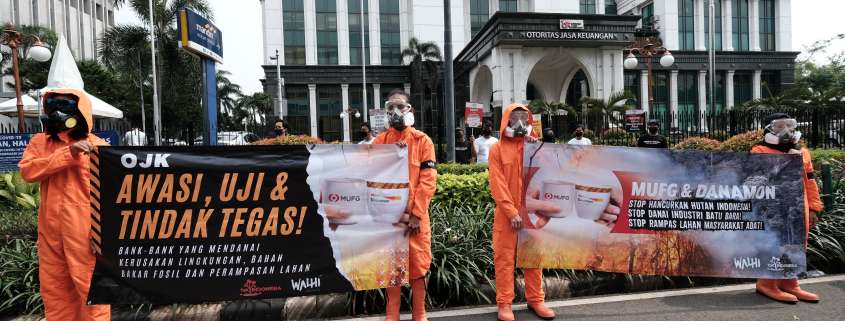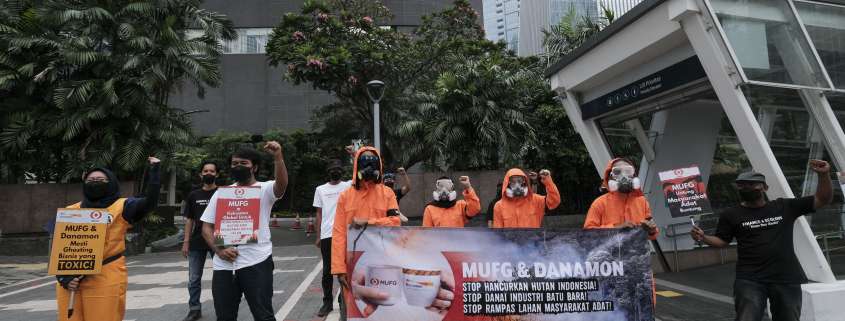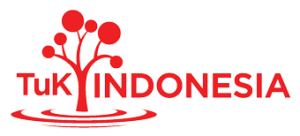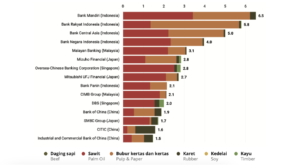Civil Society Coalition Demands That MUFG and Bank Danamon Be Held Accountable for Forest Destruction, Climate Crisis and Human Rights Violation in Indonesia


Bank Danamon becomes MUFG’s subsidiary that is exempted from MUFG’s new palm oil and forestry policies, impairing the quality of its Annual Sustainability Report and its Sustainable Finance Action Plan
Jakarta, 5 April 2021 – A civil society coalition is staging a protest in front of a branch office of Mitsubishi UFJ Financial Group (MUFG) in Jakarta. It is calling on the Group to stop financing climate crisis through its loans to some of major mining and agribusiness companies in Indonesia. It is also demanding that MUFG adopt the “No Deforestation No Peatland, No Exploitation” (NDPE) standard and apply it to all financing by MUFG and its subsidiaries, including that provided in Indonesia for a number of Indonesia’s largest palm oil, and pulp&paper groups such as the Sinar Mas Group (SMG), Royal Golden Eagle (RGE), the Salim Group and the Jardine Matheson Group.
“MUFG is rapidly expanding its business in Indonesia and recently acquired the sixth largest bank in Indonesia called Bank Danamon. However, this subsidiary is not even required to abide by the MUFG’s new palm oil and forestry policies, enabling it to take advantages at regional level to execute transactions in illegal and risk sectors,” said Edi Sutrisno, Director of TuK INDONESIA.
With no explicit commitment to best practices such as NDPE, MUFG’s policies seem half-hearted. Furthermore, it continues to accept the Program for the Endorsement of Forest Certification (PEFC), which is a weak standard as it still certifies businesses that destroy natural forests and peatland and cause conflicts with communities. Since 2016 MUFG has provided over $500 million in loans to the Sinar Mas Group (SMG), a major Indonesian palm oil conglomerates that is considered one of the most culpable companies for the recurrent fires in Indonesia. SMG is recorded[1] as the group with a well-documented footprint of the worst human rights violation and environmental degradation, which involve land grabbing, intimidation, criminalization and violence. MUFG also continues to be among the banks that finance Indofood, Indonesia’s largest food company, which that has been repeatedly found to be involved in systematic and illegal labor exploitation in its subsidiary PT. London Sumatra, which is currently facing a lawsuit from the trade union over arbitrary dismissal.[2]
To date, the farmer group Kelompok Tani Sekato Jaya of Lubuk Mandarsah in Jambi has still been fighting for its cropland which has been grabbed and destroyed by one of SMG’s subsidiaries called PT. Wirakarya Sakti (WKS). “We badly need the land for the survival and future of our children. We want to live a quiet, peaceful, serene life here. PT WKS, please understand our situation. Please return our customary land in Lubuk Mandarsah Village,” requested Ms. Minarti, a local woman who grows and sells bananas, cassava and chili peppers to support her family.
Not only has MUFG violated human rights, it has also been actively financing companies that are intentionally using fires to clear land, often illegally. Following 2015, when fires ravaged Indonesia and burned 2.6 million hectares of forests and peat, MUFG continued to provide over $1.2 billion to companies’ palm oil and pulp & paper operations that used fire to clear rainforests and peatlands in Indonesia for plantations. To date, MUFG has had no policies to evaluate its financing to companies which use fire to clear land or companies whose supply chains are involved in burning forests.
MUFG is also among the top global bankers of fossil fuels, with significant financing for coal power, fracked oil & gas, and tar sands. In Indonesia, MUFG Securities Asia Limited has provided loans[3] for the subsidiaries of PT. Adaro Energy Tbk (ADRO), Indonesia’s largest operational coal company. According to Banking on Climate Chaos’s latest report,[4] MUFG is responsible for pumping USD 148 billions in loans and underwriting to fossil fuel companies during 2016-2020, making it Asia’s worst banker of fossil fuels and locking us into fossil fuel dependency at a time when we need to rapidly transition to clean energy.
“It’s high time large banks shifted from conventional financing to sustainable one as banks can no longer get away with their reckless financing. As the largest bank in Japan, MUFG has the knowledge and resources to be a more responsible bank and play an integral part by committing to maintaining forest stands, respecting human rights, and immediately requiring all companies that it is financing to uphold its values and commitment, including upholding environmental and social standards through contracts, and suspending relationship with those ruining our sustainable future or violating human rights. Positive change by MUFG will make a huge impact on the rest of the financial sector,” added Edi.
Dr Bayu Eka Yulian, the Secretary of the Center for Agrarian Studies of Bogor Agricultural Institute (PSA IPB University), says, “If the loss of forests and livelihood, and criminalization of ordinary people are the effect, then capital/investment is one of the causes. All the actors should therefore revisit their investment and capital allocation approaches with sustainability as the philosophy of investment in mind. Indonesia’s Financial Services Authority (OJK) with its Sustainable Finance Roadmap should strictly lead this sustainable finance movement.”
###
Contacts:
Director of TuK INDONESIA, Edi Sutrisno ([email protected]/ 0813-1584-9153)
Secretary of PSA IPB University, Dr Bayu Eka Yulian ([email protected]/ 0811-535-444)
Media contact:
TuK INDONESIA: Linda Rosalina ([email protected]/ 0812-1942-7257)
[1] Rekam Jejak Pelanggaran HAM Perusahaan Raksasa Sinar Mas Group dan Perlawanan Masyarakat di Garis Depan, RAN 2020
[2] Why are banks and investors still funding Indofood?
[3] Bayar Utang dan Ekspansi Adaro Indonesia Terbitkan Global Bond, Kontan.co.id 2019
[4] Banking on Climate Chaos Report, RAN 2021
This post is also available in: Indonesian






Leave a Reply
Want to join the discussion?Feel free to contribute!